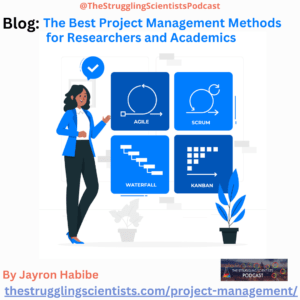Traditionally, PhDs are trained within academia with the perspective of landing an academic job. But it seems that fewer people are choosing academia as their top career choice, and many end up working outside academia. The question is: are PhD students enough prepared for all types of careers? Formal training is not common, but things might evolve on that matter.
Academic careers are not the default route
PhD programs traditionally prepare students for academic careers. In 2019, 56% of graduate students ranked academia as their first choice according to a large worldwide survey conducted by Nature. Three years and a pandemic later, they were 48%. This means that one student in two knows during their PhD studies that they won’t stay in academia. And this doesn’t even count the ones that changed their mind after the survey or did not succeed in landing an academic job (most probably a postdoc).
According to another survey in the UK, only 30% of PhDs end up in academia. From half of PhDs intending to continue in academia, only one-third actually do so. The cause? The number of awarded diplomas outranks the number of available academic positions. And the numbers increase every year. With more PhDs than academic jobs, mathematically, some of them won’t access academic positions in academia even if they want to.

Just by looking at the numbers, academic careers are definitively not the main route. But traditional beliefs still hold academia as the default path – the one PhDs are trained and conditioned for. PhDs mainly receive career advice from academics and for almost 40% of them, they are either unaware of their options or they lack support.
“All of our language in academia encourages researchers to be academics. The challenge is getting over this psychological barrier to help researchers look more widely in terms of employment.” – Sally Hancock, an education researcher at the University of York, UK, in PhD career paths hold promise.
In this context, academia appears almost as a passive choice with limited opportunities.
Non-academic careers are predominant
Non-academic careers are clearly the most chosen path. They include industry, government, medical, communication, non-profit organizations, etc. Here is a very complete list of jobs outside academia. The thing is, PhD students – including myself at the time – don’t even know about most of these jobs and their requirements.
This means that to land such a job (provided we know it exists), PhDs have to change their mindset, detach from academic (mis)conceptions. Choosing a non-academic career is an active choice that takes extra work to get. Why is that? Because PhD minds are designed to do research in academia. A PhD study is often a first job experience that doesn’t leave much time to think about post-graduation careers, especially when those around us are academics. Information on non-academic careers is thus hard to find.
It is an active choice that requires the PhD students to do their own research. All of this makes the world outside academia a whole new environment that implies starting from scratch. It takes extra work to figure out how to leap over the other side.

Non-academic careers and academic careers are equally valuable
Beyond training formats on post–PhD careers, the most realistic approach would be to no longer see academic career as the default. This corresponds neither to the wishes of PhDs – at least half of them don’t want an academic career – nor to the numbers – there are not enough positions in academia for everyone. So why not start to equally consider academic and non-academic careers?
Often, PhD students are asked about their plans for a postdoctoral position, which puts academic careers in the spotlight. But instead of asking about a postdoc, we should be asking about career paths. This will enable PhDs to explore more options and make well-informed decisions while having a wider perspective for their next career move.

Even with the majority of PhD students ending up in non-academic jobs, little is done in terms of training to prepare them for their most likely career.
Should training be reformed?
There is an ongoing debate on whether PhD programs should include career training. Some argue that formal career training is not necessary. PhD programs already equip PhD with transferable skills: communication, critical thinking, project management, teamwork, adaptability, independence, and problem solving. And this should be more than enough for most jobs out there. For many PhDs, it is true, especially when they choose an academic position. On the other hand, there are not enough positions for everyone in academia which is becoming less and less appealing. So preparing PhDs only for academia is utopic. After all, PhD is one of the highest and most demanding diploma, it should at least prepare for every type of career!
PhD training primarily involves conducting laboratory research, attending conferences, and occasionally taking courses. For the rest, the challenge is to go to career workshops and networking events, increase online presence, and seek advice from supervisors, colleagues, and mentors. Most of the time, PhD programs do not include mandatory courses on career opportunities and only a few optional courses (in the shape of short workshops).
If we were to prepare PhD students for their career, what format should it take?
Formats for training PhDs on career options
Although far from the majority of cases, some Universities and PhD programs do offer support, courses, and internships to fully train their students. This takes several forms:
1. University courses

Universities do offer some courses to help PhD students with their future career. Most of the time though, these courses are not part of the PhD program but more optional courses that students can enroll in voluntarily. French doctoral programs require 50 hours of transversal courses for students to develop skills outside their field. In these 50 hours, students can choose among a variety of courses including career development. When I did my PhD in this system, I took a day-long optional course on industrial jobs, and that was it for the entire PhD. Stanford University organizes next March a one-day seminar on careers after PhD for their students. This “PhD Pathways” seminar will give students comprehensive tools to anticipate their future career.
2. Online resources

Online resources such as blog posts and editorials, are probably the most widely used source of information for PhD students. They provide information about potential career paths and share helpful tips. A lot of courses are available online, free of charge, like the MOOCs (Massive Open Online Courses). Other resources include websites and blogs from academics and former academics who switched careers. Here are some that you might want to check out: AltAcChats, Life After my Ph.D., Nature Careers, and Cell Mentor.
3. Industry internships

A short industry internship in the middle of a PhD can be not only a welcome break from the lab but also a great opportunity to expand one’s skillset. UK students benefit from “Professional Internships for PhD Students” (PIPS) proposed in some doctorate programs. PIPS are 3-month professional placements hosted by an external organization that aims to provide training in non-academic skills and increase employability. Many other universities offer internship possibilities during the PhD. Students benefit from doing so as Kristina Ulicna in this podcast.
4. Industry-linked PhDs

Want more industry? Industrial PhDs offer the opportunity to students to have one foot in the lab and one in a company during the whole time of the PhD. They resemble classical PhDs: research is at the center, they last about the same time and end up with a thesis defense. But PhD students are better prepared for a position in the industry. This is particularly the case for chemistry, pharmaceutical, and biotech companies. In the UK, the University of Cambridge is particularly well positioned with the highest number of studentships in collaboration with pharmas. In France, PhD students favored more and more industrial theses through the CIFRE (Conventions Industrielles de Formation par la Recherche [Industrial research training conventions]). According to their numbers from 2020, 90% of CIFRE doctors found a job within 6 months.
5. Career advisors

In the case none of the previous options are offered by your program, don’t worry – your university should still have a career advisor with whom you could make an appointment. Both universities I studied at had career advisor services.
Conclusion
PhD students may not receive formal training for a career outside of academia in the near future; Choosing a non-academic career may continue to be considered as the second choice. As long as this is true, PhD students will keep seeking opportunities for themselves. On the bright side, doing a PhD equips you with all the necessary skills for lots of fulfilling careers. And struggling a little to find a non-academic job can teach you valuable life lessons. Former academics went down that road and are keen on providing PhD students with advice giving them realistic expectations and actionable tips. Check out episode 68 about leaving academia for a non-academic career and episode 40 about entering consulting after PhD.
Whether or not PhDs seek non-academic careers, I am convinced that we all end up doing just fine in our post-graduation life.







